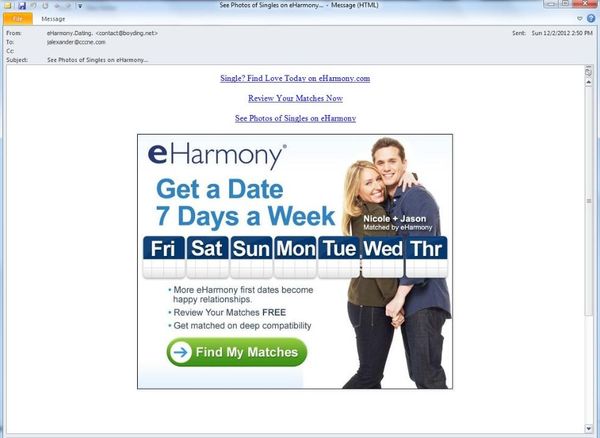Fraudulent Website Suckers Germans with MacBooks, iPhones and iPads

A new spam campaign uses the promise of hot dates to lure Germans to a page with promises of MacBooks, iPhones and iPads. The e-mail poses as an announcement from eHarmony to see photos of singles and “find love today” but it actually works to attract victims to a fraudulent web site.
After clicking on the link promising photos of singles, users are redirected to a fake survey website and tempted with popular awards such as MacBooks, iPhones and iPads. The scam registers users’ IPs and shows a different message, depending on the country. So far, German users are the most exposed, as they are lured with a well-crafted survey allegedly from Mozilla.
Germans answering the fake “30-second” Firefox survey to evaluate their experience with the browser are tempted with the possibility to win either a MacBook Air, 2 iPhone 4S or an iPad.
After answering questions about their satisfaction with Mozilla’s browser and their Internet habits, Germans are asked to select one of the products they would like to win. In fact, the choice is limited to the MacBook, as it`s the only link-enabled image, which redirects them to another scam.
 The website is blacklisted for its fake promotions, offers and surveys and Bitdefender marks it as fraud. German users are warned not to enter any information or accept transactions. Their personally identifiable information is actually transferred to several other web sites, then used in spam campaigns and telemarketing scams.
The website is blacklisted for its fake promotions, offers and surveys and Bitdefender marks it as fraud. German users are warned not to enter any information or accept transactions. Their personally identifiable information is actually transferred to several other web sites, then used in spam campaigns and telemarketing scams.
The MacBook Air is once again promised to users if they register their cell phone number, and they answer 10 general knowledge and mathematical questions. At the same time, several pop-ups lure Germans with more tempting awards such as a 1.000.000 prize.
 The scammy website tries once again to trick Germans with the irresistible offer of an Apple iPhone 5 + – 20,000 if they give their personal details.
The scammy website tries once again to trick Germans with the irresistible offer of an Apple iPhone 5 + – 20,000 if they give their personal details.
When entered by English-speaking users, the eHarmony scam leads to “free” WMA and video converters and another similar fraud.
After the massive LinkedIn password breach, dating site eHarmony confirmed in June a similar attack on its users. The dating service recommended that people create stronger passwords of at least eight characters, mixing upper and lower-case letters, numbers and symbols, use different passwords for each Internet site and change passwords every few months.
All product and company names mentioned herein are for identification purposes only and are the property of, and may be trademarks of, their respective owners.
This article is based on samples provided by Ionut Raileanu, Bitdefender Spam Analyst.
tags
Author
Bianca Stanescu, the fiercest warrior princess in the Bitdefender news palace, is a down-to-earth journalist, who's always on to a cybertrendy story.
View all postsRight now Top posts
How to Protect Your WhatsApp from Hackers and Scammers – 8 Key Settings and Best Practices
April 03, 2025
Outpacing Cyberthreats: Bitdefender Together with Scuderia Ferrari HP in 2025
March 12, 2025
Streamjacking Scams On YouTube Leverage CS2 Pro Player Championships to Defraud Gamers
February 20, 2025
How to Identify and Protect Yourself from Gaming Laptop Scams
February 11, 2025
FOLLOW US ON SOCIAL MEDIA
You might also like
Bookmarks












